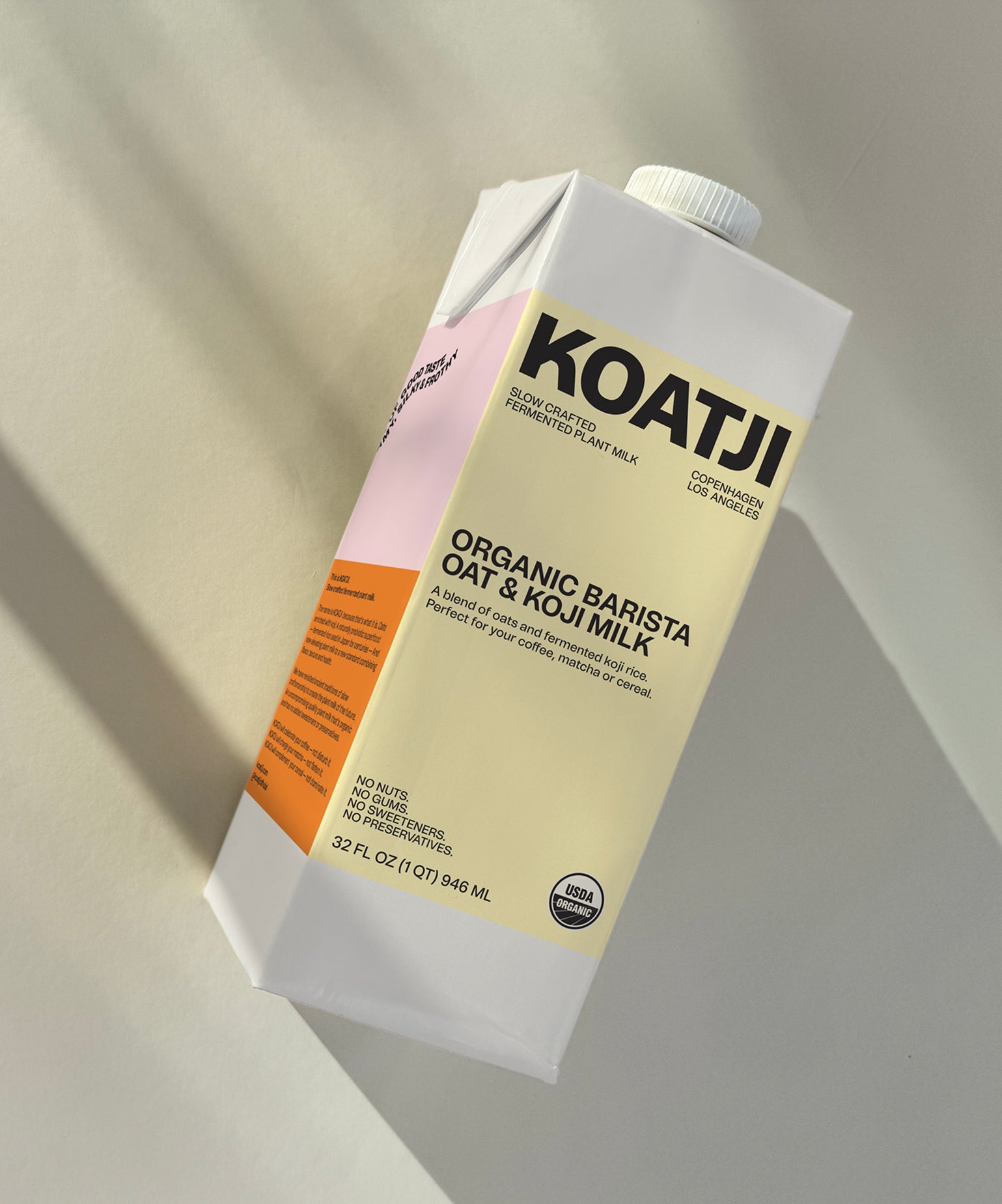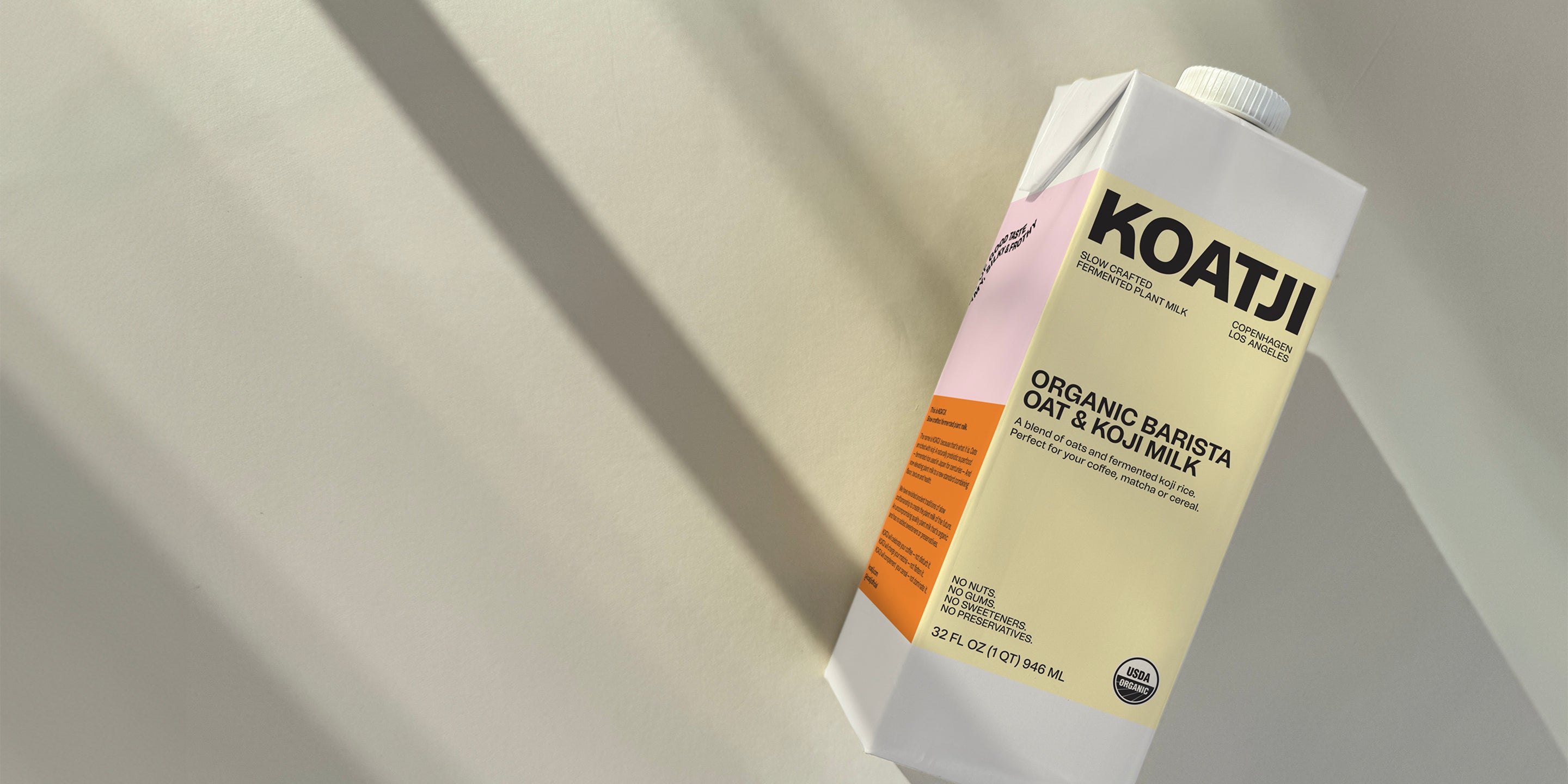What is KOATJI?
KOATJI is a proprietary plant-based milk recipe developed over three years in our R+D lab by a team of Michelin chefs and baristas. It took more than 8000 experiments to get it just right.
Our mission: to craft a 100% organic, nutritious, plant-based milk made from sustainable ingredients that is free from any additives. The milk had to taste delicious enough to enjoy on its own, but also set a new standard for mouthfeel, foamability, and versatility at the espresso machine and in the kitchen. We have met our mission: whether Koatji is paired with coffee, matcha, cereal, or even cocktails, it a harmonious, delicious fit.
There is an industry secret in plant-milk. There’s a reason other brands employ gums, fillers, and other additives. It turns out that rethinking this paradigm, and embracing an additive-free approach is hard, but not impossible. That’s why it took us a while. This write-up dives into the finer details of KOATJI for those who would like to know more about this ground-breaking new product and the ingredients we use.
LET'S TALK ABOUT INGREDIENTS!
WHY ORGANIC AND NON-GMO?
By definition, USDA certified organic products are also non-GMO. At KOATJI we are big believers in organic farming methods. It assures that the soil remains healthy and avoids soil depletion which in turn results in the most nutritious crops available. In addition, the CO2 footprint from organic farming is lower than conventional farming; and lastly, there are no chances of leftover residue from pesticides and chemicals entering the harvest (a no-go in organic farming and processing.) Not only does your body benefit from eating foods free from pesticides and chemicals, but it also helps to protect our drinking water reservoirs. Organic farming is a win win win win situation and parmount to KOATJI’s design, flavor, and ethos.
WHY DO WE NOT USE ADDITIVES, PRESERVATIVES, GUMS, FILLERS OR ADDED SUGAR?
Much of the world, led by the U.S., is amid a public health crisis of unfathomable proportions. Obesity rates are higher than ever before in history – not only in adults – but increasingly so in children. One factor in the obesity epidemic is an overly high intake of ultra-processed foods created with all kinds of additives, gums, ‘natural flavors or colors’ (unfortunately, this nothing natural about ‘natural flavors’), preservatives, and sugar. 75% of all foods sold in the US today are spiked with refined sugar or/and artificial taste enhancers. These added elements make the commercial food and drink products cheaper to produce (longer shelf lives) and trigger the human brain to desire more of it. This toxic system was devised with the goal of securing higher sales and better profit margins – not to nourish the end consumer.
At KOATJI, it’s our raison d’être to refuse any involvement in this unhealthy system of food development. Our product is aligned with our core planetary and human health goals. We want to make our planet a better place by creating products that are both good for human and planetary health. We pay a higher price for our ingredients to fulfill this promise, but we believe it’s a small price to pay when considering the results: a better product in every conceivable way.
WHAT IS KOJI?
You know about oat milk, but Koji is a cooked grain inoculated with a fermentation culture called Aspergillus oryzae, a koji mold, used in Japanese cuisine for centuries to make sake, miso, and other fermented foods. Koji is prepared by adding koji mold to steamed grains, then carefully kept in warm, humid conditions that promote growth. The fermentation process produces over 100 types of enzymes that break down proteins into amino acids, adding umami and nuttiness to the flavor, while breaking down starches into glucose, which creates natural sweetness.
WHAT ARE THE HEALTH BENEFITS OF KOJI?
The fermentation process that creates Koji yields enzymes and beneficial compounds believed to offer health advantages, including potential immune-boosting and anti-inflammatory effects. It’s a natural source of ergothioneine, an amino acid that works as a very effective antioxidant and is known as nature’s longevity vitamin. Koji naturally contains essential vitamins B2, B6, and B12.
Ergothioneine (ERGO)
ERGO is a potent amino acid with antioxidant properties, first discovered in 1909 in Ergot fungus and known for its potential health benefits. ERGO can scavenge reactive oxygen and nitrogen species and thereby mitigate oxidative damage to biological molecules that contribute to chronic human diseases. ERGO may also help protect cells from oxidative stress and damage, reduce inflammation, support immune function, and promote cellular health. ERGO is also thought to play a role in neuroprotection, potentially lowering the risk of neurodegenerative diseases like Alzheimer’s and Parkinson’s. Additionally, it might have cardiovascular benefits by contributing to heart health and reducing the risk of certain chronic diseases. Ergothioneine is naturally found in some foods like mushrooms, beans, and koji. (source)
B12 Vitamin
Vitamin B12, or cobalamin, is essential for DNA synthesis, red blood cell formation, nerve health, and energy production. It’s normally found in animal products and fortified foods, but also naturally through fermented foods such as Koji.
B6 Vitamin
Vitamin B6, also known as pyridoxine, is crucial for various bodily functions, including metabolism, nerve function, and red blood cell formation. It’s found in foods like meat, fish, poultry, bananas, potatoes and Koji.
B2 Vitamin
Vitamin B2, also known as riboflavin, is essential for energy production, metabolism, and maintaining healthy skin and vision. It’s found in foods like dairy products, meat, fish, and leafy green vegetables and Koji.
WHY USE KOJI AND OATS?
KOATJI uses oats in combination with koji because they pair beautifully in flavor and texture. Oats have impressive sustainability credentials, using less water and land than other ingredients (i.e. almonds.) Oats have a lower carbon footprint and adapt to diverse climates, enhancing their sustainability, ensuring resilience in agricultural practices. Perhaps most notably, oats boast a lower carbon footprint than dairy milk. In a nutshell, oats contribute significantly less to greenhouse gas emissions. We’ll drink to that.
WHY DOES THE LABEL MENTION “ADDED” SUGAR WHEN THERE’S NO SUGAR IN THE INGREDIENT LIST?
The FDA has changed its regulations, requiring the natural sweetness that comes from the enzymatic breakdown of starches in oats and koji rice into maltose and glucose to be labeled as “added sugar.” These natural sugars, maltose and glucose, are your body’s preferred carb-based energy source and are different from refined table sugar (sucrose), which is often referred to as “empty calories” due to its lack of nutritional benefits. (source)
Regrettably, the US Food and Drug Administration (FDA) doesn’t presently distinguish between these different types of sugar on nutrition labels. Regardless of whether it’s naturally occurring sugar or sugar added during production, all sugars are blanket-labeled as “added sugar.” Regrettably, this causes confusion in the market and explains why our product’s nutrition label indicates “added sugar” despite the fact that we haven’t added any sugar to our product.
WHAT’S THE DIFFERENCE BETWEEN NATURAL SUGAR (MALTOSE AND GLUCOSE) AND REFINED SUGAR (SUCROSE)?
Natural sugar appears as the enzymes break down the starches in our oats and koji rice, similar to how the human body metabolizes starches into sugar during digestion. Let’s break down how this affects your body and how it’s different from table sugar.
Maltose
Maltose, consisting of two glucose molecules, is less sweet compared to glucose or sucrose. It plays a pivotal role in brewing and baking, aiding fermentation and enhancing flavor. This type of sugar primarily provides energy for the body and can be naturally found in grains and vegetables.
Glucose
Glucose provides essential energy for the body, particularly the brain and muscles, supports metabolic regulation, aids in physical performance, and contributes to the various cellular functions necessary for overall health and well-being.
Sucrose (also referred to as table sugar)
Typically, when we think about added sugar, we think about refined sugar or table sugar (also referred to scientifically as sucrose and made from sugar beets or sugar cane.) While glucose is essential for our body to function, sucrose is not. Sucrose could rightly be termed “empty calories” and is without any nutritional benefits. It is for this reason that we never add any sugars or any other sweetener to our products. (source)
HOW DOES THE NATURAL SUGAR IN KOATJI AFFECT MY BLOOD SUGAR?
To understand how KOATJI impacts your blood sugar, let’s discuss the concept of glycemic load (GL).
Blood sugar effect and the Glycemic Load4
From time to time, it’s relevant to consider how the carbs or sugar in KOATJI affect the increase in blood sugar when broken down into natural sugars. An increase in blood sugar triggers an insulin response – a rise and fall in energy levels -- when a stable energy level is the gold standard of glycemic health. The Glycemic Load (GL) offers a good picture of how certain foods affect a person’s blood sugar. The Glycemic Load (GL) takes the glycemic index (GI) of a product and factors in portion sizes. GL values range from 0 to 100 and can be classified as follows:
Low GL: 0 – 10
Moderate GL: 11-19
High GL: 20+
Low GL foods are more beneficial for those looking to keep their blood sugar levels steady.
The Glycemic Load of a KOATJI cortado is 1.6 and a KOATJI cappuccino comes in at 3.1. In comparison, the GL of a baked potato is 25 and an Apple is 10. KOATJI, as you see, is far lower on the GL index and only minimally impacts a person’s blood sugar.
Now, please keep in mind that people rarely eat or drink things in isolation, so this is not to say that a potato is unhealthy. The effect of any one ingredient on your blood sugar is moderated by whatever else you have in your digestive system. That goes for a potato, an apple and for KOATJI. (source)
IS THE SUNFLOWER OIL IN KOATJI HEALTHY FOR YOU?
Yuka, the world’s leading food scanner app, rates KOATJI as excellent for your health, scoring 88 out of a 100. We use organic sunflower oil for its healthy fats and to add mouthfeel and foamability to the product. Our sunflower oil is rich in unsaturated fats and vitamins, including vitamin E and B, folate and niacin. However, this is not to say that all sunflower oils, let alone all seed oils are healthy for you. Far from it. To fully understand how and why different seed oils interact in the human body, we need to dive deep into the nuances of oils.
When discussing oils and health, the gold standard of oil is organic, extra virgin olive oil. Here at KOATJI, we love organic, extra virgin oil for its standalone taste and its richness of unsaturated fats and oleic acids. You can’t really discuss oils and health without talking about unsaturated fats and oleic acids. (source)
Unsaturated fats are considered beneficial fats because they can improve blood cholesterol levels, ease inflammation, stabilize heart rhythms, and play other beneficial roles. Unsaturated fats are predominantly found in foods from plants, such as vegetable oils, nuts, and seeds. (source)
There are two types of “good” unsaturated fats:
Monounsaturated fats are found in high concentrations in olives, peanuts, avocados, nuts such as almonds, hazelnuts, and pecans and seeds such as sunflower, pumpkin and sesame seeds.
Polyunsaturated fats are found in high concentrations in sunflower seeds and oils, hemp seeds, flax seeds, walnuts, and fish. The two major classes of polyunsaturated fatty acids (PUFAs) are the omega-3 and omega-6 fatty acids. We’ll come back to this in a moment.
For context, an olive oil needs to contain 55% unsaturated fats to be able to make the extra virgin claim. The better extra virgin olive oils on the market typically contain around 70-75% unsaturated fats and only on rare occasions contain over 80%. Breaking down the unsaturated fat split further, olive oil typically contains 70-80% monounsaturated fats vs 20-30% polyunsaturated fats.
ARE UNSATURATED FATS, IN PARTICULAR POLYUNSATURATED FATS HEALTHY FOR YOU?
Omega-3 and Omega-6 fatty acids are essential fatty acids. They are necessary for human health, but the body cannot make them by itself: one must get them through food. The two major classes of polyunsaturated fatty acids (PUFAs) are the omega-3 and omega-6 fatty acids. Along with omega- 3 fatty acids, omega-6 fatty acids play a crucial role in brain function, and normal growth and development. As a type of polyunsaturated fatty acid (PUFA), omega-6 helps stimulate skin and hair growth, maintain bone health, regulate metabolism, and maintain the reproductive system. (source)
DO OMEGA-6 FATTY ACIDS PROMOTE INFLAMMATION IN YOUR BODY?
A healthy diet contains a balance of omega-3 and omega-6 fatty acids. Omega-3 fatty acids help reduce inflammation, and some omega-6 fatty acids tend to promote inflammation. However, there are several different types of omega-6 fatty acids, and not all promote inflammation. Most omega-6 fatty acids in the diet come from vegetable oils, such as linoleic acid (LA) found in KOATJI, not to be confused with alpha-linolenic acid (ALA), which is an omega-3 fatty acid. Linoleic acid is converted to gamma-linolenic acid (GLA) in the body.
GLA has been studied to potentially help reduce inflammation in the body. Much of the GLA, taken as a supplement, is converted to a substance called DGLA that fights inflammation. Having enough of certain nutrients in the body (including magnesium, zinc, and vitamins C, B3, and B6) helps promote the conversion of GLA to DGLA.
WHY DOES SUNFLOWER OIL GET A BAD REPUTATION IN THE WELLNESS AND HEALTH INDUSTRY?
Seed oils have at times been given a bad rap in the wellness industry. Scientists from Harvard’s T.H. Chan School of Public Health (source) and elsewhere (source) have debunked this: it’s worth diving further into the finer details of sunflower oil to understand why. It turns out that not all sunflower oils are created equal. It’s all about how it’s grown and processed.
Originating from North America, sunflowers were used by Indigenous peoples for thousands of years. They made use of sunflower seeds for food, skincare, and medicinal purposes. Widespread usage of sunflower oil started in the 19th Century, after reaching Eastern Europe. Originally, sunflower oil was extracted with a screw press, also called an expeller press, but as technology advanced, a solvent extraction process was invented using chemicals and further processing to increase the oil yield from the seed. Both processes are still used today, but they are not equal when it comes to health and nutrition.
WHAT SETS APART EXPELLER-PRESSED, COLD-PRESSED, AND SOLVENT-EXTRACTED OILS, AND WHY IS IT IMPORTANT?
Expeller-Pressed Process
Rather than using chemicals, expeller pressing uses a screw press to physically force the oil out of the seed. A screw press, or expeller press, is a machine that presses nuts and seeds through a cavity and uses intense pressure and friction to extract oil. There is no chance of experiencing leftover residue from hexane or other chemicals because no solvents are used in the expeller-pressed process.
Additionally, there is no heat added during this extraction process, as heat is already created through the friction that occurs when the seeds are pressed.
Expeller pressing extracts about 87 to 95% of the oil out of the seed, so some oil is left over after the pressing process is completed. As such, this is not as effective a way to drive yield from the seed compared to the solvent extracted process. Therefore, an expeller pressed process is more expensive (all-natural, yet less yield).
Cold-Pressed Process
Cold-pressed seed oils refer to expeller-pressed oils that are produced below 122 degrees Fahrenheit through to the finished product.
Solvent Extracted Process
In the solvent extracted process, the seeds are ground up into a paste before the oil can be removed. Next, the ground seeds are purged or washed with a solvent such as hexane to release the fat within. The solvent is then removed from the oil in a sealed chamber. Finally, the oil is subject to a refining process known as Refined, Bleached and Deodorized, or “RBD.”
Solvent expelling extracts 97 to 99% of the oil out of the seed. This method is the most efficient way to get all the oil out of the seeds, resulting in higher yield, cheaper products yet cannot escape the truth of the solvent-extracted process being an ultra-refined product produced with the help of chemicals.
So, the secret about sunflower oil and health lies in knowing which type of sunflower oil you’re dealing with. In KOATJI, we use the highest quality organic sunflower oil possible, and compared to extra virgin olive oil, it contains +80% unsaturated fats and both mono- and polyunsaturated fats in about the same ratio as extra virgin olive oil, so about 70-80% monounsaturated fats vs 20-30% polyunsaturated fats. Furthermore, our organic high oleic sunflower oil comes from expeller-pressed GMO-free organic sunflower seeds, grown and processed without the use of any pesticide or chemicals. Nor has Koatji’s sunflower oil been bleached.
WHAT IS POTASSIUM CARBONATE?
Potassium carbonate, also called potash, is a white salt, soluble in water that forms an alkaline solution that can balance acidity in food products. In KOATJI, we use it as an acidity regulator which helps to balance out the high acidity that KOATJI is exposed to when added to coffee. Potassium carbonate is one of the few acidity regulators that is approved to use in organic products.
Potassium is a mineral that is essential for proper functioning of the heart, kidneys, muscles, nerves, and digestive system as well as helping move nutrients and waste around your cells and it counterbalances the use of salt’s negative impact on your blood pressure.
In short, KOATJI is crafted with a focus on premium quality, sustainability, health, and flavor. We offer a unique plant-based milk that balances tradition and innovation, with genuine mission to further the wellbeing of both people and our planet.


